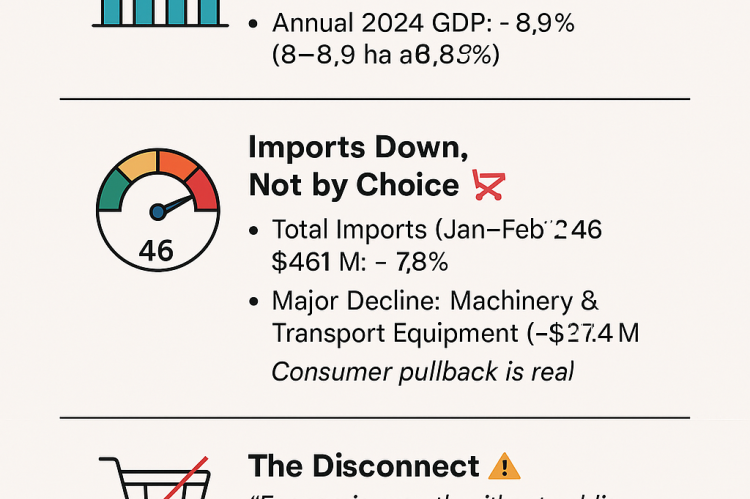Confidence Dips While Economy Grows: What Belizeans Need to Know
ECONOMIC SPOTLIGHT
By: Omar Silva, Editor/Publisher
National Perspective Bz – Digital 2025
Belize City: Thursday 27th March 2025
At first glance, Belize’s economy appears to be in good health. The latest figures from the Statistical Institute of Belize (SIB) show that in the last quarter of 2024, the country’s economy grew by a solid 7.1%, driven by strong performances in services like tourism, transportation, and retail. Annual GDP rose to $5.54 billion, an impressive 8.2% increase over 2023.
But underneath this encouraging headline lies a troubling development: consumer confidence has fallen sharply.
According to the SIB, the Consumer Confidence Index (CCI) dropped by 8.9% in February 2025 compared to January. The index, which gauges how people feel about their personal finances, the national economy, and whether now is a good time to make big purchases, fell to 46 points—well below the midpoint of 50 that separates optimism from pessimism.
This dip follows four straight months of improved confidence between October 2024 and January 2025. February's reversal sends a clear signal: despite strong GDP figures, many Belizeans are feeling uncertain or anxious about their economic future.
The Warning Signs Beneath the Surface
A closer look reveals what’s driving this downturn in sentiment. All three components of the index—current financial conditions, future expectations, and major household purchases—fell in February.
Most notably, confidence in making big purchases (what economists call durable goods like furniture, appliances, and vehicles) dropped from 41.6 to 37, the lowest among the three indicators. This shows that people are pulling back from spending, particularly on higher-cost items, likely out of fear that times ahead may get harder.
What This Means for Trade:
This drop in consumer sentiment coincides with another important shift: imports are down.
In the first two months of 2025, Belize imported $461 million worth of goods—a 7.8% decline from the same period last year. The largest drop was in machinery and transport equipment, falling by $27.4 million. While part of this is due to a one-time generator purchase last year, the numbers still point to a broader cooling in demand for high-value imports.
At the same time, domestic exports are up by 12.3%, thanks mostly to a boost in marine products, particularly lobster and conch. That’s good news for Belize’s producers, but it doesn’t cancel out the concern that a decline in consumer imports could signal economic stress ahead.
A Tale of Two Realities
Herein lies the contradiction: GDP is up, but consumer confidence is down.
Why? One explanation is that economic growth figures often lag behind real-time sentiment. The 7.1% GDP growth reflects activity from October to December 2024. Meanwhile, the February CCI reflects how people feel right now, in early 2025.
If wage growth isn’t keeping up with inflation, if utility or fuel costs are climbing, or if household debt is weighing down families, then economic optimism can fade—despite what national statistics say.
The Political Implications:
For decision-makers and stakeholders, this divergence between national growth and personal pessimism must not be ignored. The government may celebrate rising GDP, but the public lives their economy through what’s in their wallet, their kitchen, and their electricity bill—not through statistical press releases.
If consumer confidence remains low, it could eventually lead to:
- Slower retail activity
- Lower demand for imported goods
- Delayed investments by local businesses
- And even a tapering off in GDP growth in future quarters
Where Do We Go from Here?
Belize’s economic outlook is at a crossroads. The current situation offers a window of opportunity—GDP growth provides some breathing room, but policymakers must address the undercurrents of public unease.
This means:
- Tackling inflation and stabilizing household costs
- Offering better job security and wage increases
- Creating affordable credit access
- And ensuring that economic gains reach every district and social group
In short, the numbers look good, but the people don’t feel good. And until consumer confidence rebounds, the economy’s success story may remain unfinished.
- Log in to post comments

